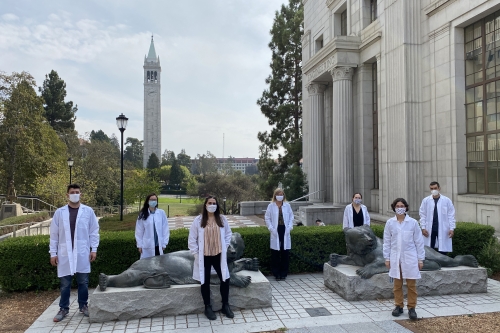When the COVID-19 pandemic hit, the Nelson Lab group, which had traditionally researched pathogens in water, immediately thought, “What can we do to help?” This motivation led the group to develop COVID Wastewater Epidemiology for the Bay Area (COVID-WEB), an innovative partnership between UC Berkeley researchers, campus Environmental Health & Safety staff, 19 different local wastewater agencies, and 6 local public health departments to monitor the SARS-CoV-2 virus on campus and in the San Francisco Bay Area. COVID-WEB has been recognized with a 2021 Chancellor's Award for Public Service, which acknowledges its exceptional commitment to advancing social change through public service and improving the quality of life in our community.
Over the last year, COVID-WEB has analyzed wastewater samples from around UC Berkeley and the greater San Francisco Bay Area for SARS-CoV-2, the virus that causes COVID-19. Because people who are infected with COVID-19 excrete the SARS-CoV-2 virus in their feces, detection of the virus in wastewater can provide critical information about infection levels in the population to complement other public health data.
COVID-WEB developed novel methods to detect SARS-CoV-2 in wastewater, built out a laboratory and laboratory team and quickly ramped up to conduct routine monitoring. It regularly presents results of approximately 150 samples each week from 38 different sampling locations to local public health decision-makers. Over 2300 samples have been analyzed to date. In addition, the team is working on genetic sequencing of wastewater to detect mutations, which can provide information on whether new COVID-19 variants are being introduced from other regions.
The team, led by Professor Kara Nelson, has seen that wastewater data about SARS-CoV-2 have a real, beneficial effect on managing the pandemic. For example, COVID-WEB’s wastewater data provided early warning to a local prison medical officer about an outbreak at the facility, allowing her to take extra precautions which likely reduced disease transmission. In another example, a local public health department was able to allocate strained contact-tracing resources to a sewershed which displayed relatively high concentrations of the virus in wastewater, but for which they had little clinical testing information.
Moving forward, wastewater data is likely to be even more valuable as more of the population is vaccinated and routine clinical testing rates decline. COVID-WEB has exemplified one way in which UC Berkeley, in partnership with local public health and wastewater agencies, can leverage its scientific resources to make a difference in the course of the COVID-19 pandemic.
CEE students and researchers who are part of the COVID-WEB team:
- Postdoc: Rose Kantor
- Grad students: Lauren Kennedy, Hannah Greenwald, Adrian Hinkle, Alma Bartholow, Liwen Wang
- Undergrad students: Aliya Ehde, Joaquin Bradley Silva, Christina Lang, Christina Baily, Karen Lee, Amita Muralidharan, Constance Chiang

